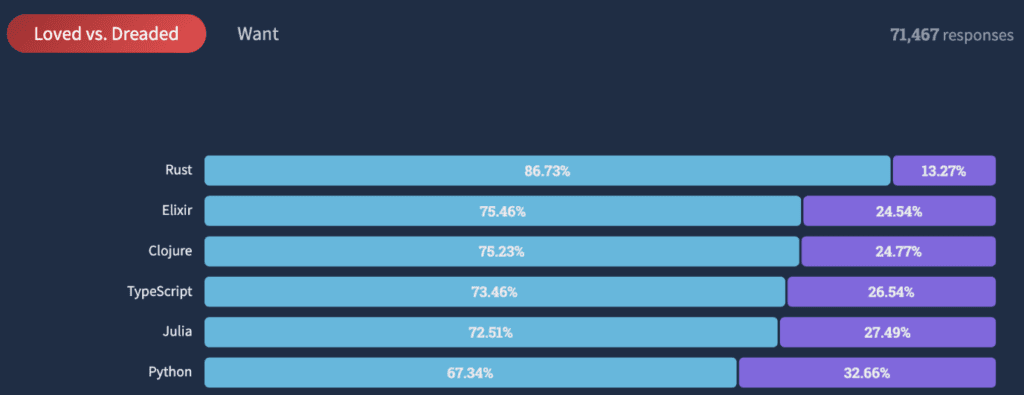Developers are often bamboozled by an overwhelming number of programming languages available at their disposal. In that regard, choosing the right language is essential to determining how the MVP (*Minimum Viable Product), and the final product will pan out eventually. C++ Vs Rust are two highly popular programming languages that offer multi-level flexibility.
The latter, however, depends on the types of project C++ Vs Rust are used for, and the programmer’s individual skills.
This post lends insight into the C++ Vs Rust comparison, Rust Vs C++ performance, as in which one’s better among the two in terms of performance metrics, etc., and why use C++ over Rust if you are a new developer.
Let’s get started.
What Is C++:

C++ is a general-purpose programming language that was developed as an extension of the C programming language. Decades ago, if you ever had the experience of the Borland environment, you know what we’re talking about.
C is a compiled language known for its efficiency, performance, and ability to directly manipulate hardware resources.
In the context of C++ Vs Rust, the former supports both procedural and object-oriented programming paradigms, allowing programmers to write code that is efficient and organized.
This language is widely used in various domains such as game development, system programming, embedded systems, and high-performance computing. It provides low-level control over hardware resources, making it suitable for developing software that requires close interaction with the underlying system.
As for recommending C++ to beginner-level programmers, it can be a double-edged sword. C++ has a steep learning curve due to its complex syntax and numerous features. It requires a solid understanding of fundamental programming concepts, such as variables, control flow, and functions, before diving into C++. Additionally, C++ introduces concepts like pointers, memory management, and manual resource allocation, which can be challenging for beginners.
However, if you’re willing to invest the time and effort to learn C++, it can be a valuable language to master. It provides a strong foundation in programming principles and exposes you to low-level concepts that are crucial for certain domains. It’s worth noting that many popular programming languages, such as Java and C#, have borrowed features and syntax from C++.
On the contrary, if you’re new to programming, it’s generally recommended to start with a language that has a gentler learning curve, such as Python or JavaScript. These languages offer simpler syntax, extensive libraries, and a large supportive community, which can help you grasp programming concepts more easily. Once you have a solid understanding of programming fundamentals, you can consider learning C++ or any other language based on your interests and goals.
What Is Rust?

Moving on with C++ Vs Rust, the latter is dubbed as a systems programming language that aims to provide memory safety, concurrency, and high performance.
It was developed by Mozilla and first released in 2010. Rust’s primary goal is to eliminate common programming errors, such as null pointer dereferences, buffer overflows, and data races, through its ownership, borrowing, and lifetimes system.
Rust is designed to be a modern language that combines the low-level control of C and C++ with high-level abstractions for safe and concurrent programming. It features a strong static type system, pattern matching, functional programming concepts, and a powerful package manager called Cargo.
While Rust syntax has gained significant popularity and has a strong and growing community, it may not be the most recommended language for beginner-level programmers.
To that effect, Rust syntax and concepts can be complex and challenging to grasp for newcomers to programming. The ownership and borrowing system, which is one of this language’s key features for ensuring memory safety, can be particularly difficult to understand and master.
Once you have a solid understanding of programming fundamentals, exploring Rust can be a great choice to learn systems programming and gain knowledge about memory safety and concurrency. Rust’s strict compiler checks and focus on safe programming practices can greatly benefit developers who work on performance-critical applications or systems-level programming.
Comparative Advantages of C++ Vs Rust: Which One Gains Precedence?

Comparing the advantages of C++ vs Rust can help you understand the strengths and trade-offs of each language.
The choice between them depends on your specific needs, project requirements, and personal preferences. Here are some comparative advantages of C++ and Rust:
Popularity Ratings for C++ Vs Rust

In 2022, Stack Overflow did a C++ Vs Rust popularity survey under the name of ‘Loved Vs. Dread’.
Of the 71k+ respondents, Rust was popular among 86% of users. That doesn’t mean that C++ is an inferior language. There’s a possibility that the respondents’ use cases may have been different in terms of Rust Suntax, Rust Vs C++ performance, and vice versa.
Advantages of C++:
Mature ecosystem:
C++ has been around for decades and has a vast and mature ecosystem with extensive libraries, frameworks, and tools. It is widely used in various domains, including game development, embedded systems, and high-performance computing.
Performance and efficiency:
C++ allows low-level hardware manipulation and provides fine-grained control over resources, making it highly efficient and performant. It has minimal runtime overhead and is often the language of choice for performance-critical applications.
Compatibility and interoperability:
C++ is compatible with existing C code and can seamlessly integrate with legacy systems. It also offers good interoperability with other languages like C and Python through various language bindings.
Advantages of Rust:
Memory safety and thread safety:
Rust’s ownership, borrowing, and lifetimes system ensures memory safety without sacrificing performance. It prevents common programming errors like null pointer dereferences, buffer overflows, and data races at compile time.
Concurrency and parallelism:
Rust has built-in support for safe concurrency through its ownership system and lightweight threading model. It enforces strict rules to prevent data races and provides powerful abstractions for concurrent programming.
Developer productivity:
Rust emphasizes clear and safe code, reducing the likelihood of bugs and enhancing maintainability. Its expressive syntax, pattern matching, and functional programming concepts enable concise and readable code.
Community and modern tooling:
Although Rust is relatively newer compared to C++, it has a rapidly growing community. The Rust ecosystem offers modern tooling, a package manager (Cargo), and strong support for documentation and testing.
In terms of precedence, the choice between C++ and Rust depends on your project requirements, the level of control and safety you need, and the trade-offs you’re willing to make.
If you’re working on an existing C++ codebase, require extensive libraries, or need maximum performance, C++ may be a better fit.
On the other hand, if memory safety, concurrency, and developer productivity are your priorities, or if you’re starting a new project where you have the flexibility to choose the language, Rust may be a compelling choice.
Rust Vs C++ Performance and Use Cases In Modern-Day Industries
When it comes to Rust Vs C++ performance, both languages are on par with the competition. Programmers often interpret Rust Vs C++ performance analysis in terms of familiarity with the programming language itself, the learning curve, and whether the said language can be used as a broad-spectrum solution.
However, preference or precedence of one language over another is a matter of business requirements.
From a general perspective, here’s a run down on Rust Vs C++ performance-based comparison, followed by common use cases in today’s industries.
Rust:
As we mentioned earlier, Rust emphasizes memory safety and aims to provide performance without sacrificing safety. It achieves this through its ownership and borrowing system, enabling efficient memory management. Rust’s strict compile-time checks can help eliminate certain classes of bugs and improve performance predictability.
C++:
C++ is known for its performance and efficiency. It provides low-level control over hardware resources and allows developers to write code that can be extensively optimized. C++ offers manual memory management, giving developers fine-grained control over memory allocation and deallocation.
Use Cases:
Rust: Rust is well-suited for systems programming, where memory safety, concurrency, and performance are crucial. It is often used in areas such as network services, web servers, operating systems, embedded systems, and blockchain development.
Rust’s memory safety features make it particularly appealing for building secure and reliable software.
C++:
C++ has a wide range of use cases due to its versatility and performance.
The question as to why use C++ is commonly used is because of its application in game development, high-performance computing, graphical applications, embedded systems, real-time systems, and performance-critical software.
Moving on with the ‘why use C++’ analogy, it is safe to say that C++ is widely used in existing codebases and legacy systems due to its compatibility with C.
It’s important to note that while Rust and C++ have overlapping use cases, their specific strengths and trade-offs may lead to different preferences in certain domains.
Rust’s memory safety and concurrency features make it a strong choice for applications that require high security and parallelism.
On the other hand, C++ excels in performance-critical applications, domains where existing libraries and frameworks are essential, or when low-level hardware access is required.
Ultimately, the choice between Rust and C++ will depend on the specific project requirements, performance needs, safety considerations, available libraries and tools, and personal preferences. Both languages have their own advantages and are capable of delivering high-performance results when utilized effectively.
Conclusion:
C++ and Rust are both equally popular and well-respected programming languages. Both are in league with their own use cases and deliverability, where one cannot say that a said language pales in comparison to another.
Everything boils down to the programmer’s preference, business requirements, and project scope.
Using the wrong language for project results in technical setbacks and the product owner’s inability to deliver something. That’s why, you need to ensure that your team is using the right language and the tools from the get-go.
That’s where Blue Zorro comes in, consult with our experts to get the technical know-how and the implementation plan for C++ Vs Rust for your upcoming project.
We look forward to hearing from you.
Good luck!


